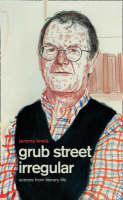


|
|
| book details |
Grub Street Irregular: Scenes from Literary Life
By (author) Jeremy Lewis

|
| on special |
normal price: R 470.95
Price: R 446.95
|
| book description |
An engaging, wickedly funny and splendidly anecdotal memoir of a career spent among writers, agents, publishers and bookmen and women of every stripe. Jeremy Lewis's first memoir, 'Playing for Time', was hailed by James Lees-Milne as 'the funniest and best written book I've read for years.' His second, 'Kindred Spirits', was described by John Carey as 'sheer pleasure from start to finish'. Now he has written a third autobiographical account of his encounters with literary figures over the last two decades which fittingly caps the previous two. A rich sense of the absurd and a profound understanding of the extreme comicality of life, together with a delight in the oddities of human behaviour, are the hallmarks of Jeremy Lewis's world. Bumbling figures of the book trade and eccentric luminaries of Grub Street alike are grist to his mill; his characterisations of Andre Deutsch, James Lees-Milne, Alan Ross, Richard Cobb, Barbara Skelton and dozens of others -- are written with huge warmth and affection. Seldom has modern literary life been described with such a sense of relish and enjoyment; and seldom has the reader been so richly entertained by a gallery of eccentric portraits.
| product details |

Normally shipped |
Publisher | HarperCollins Publishers
Published date | 1 Jul 2008
Language |
Format | Hardback
Pages | 352
Dimensions | 222 x 141 x 30mm (L x W x H)
Weight | 498g
ISBN | 978-0-0025-5906-5
Readership Age |
BISAC | biography & autobiography / personal memoirs
| other options |
|
|
|
To view the items in your trolley please sign in.
| sign in |
|
|
|
| specials |
|
|
|

|
Mason Coile
Paperback / softback
224 pages
was: R 520.95
now: R 468.95
|
A terrifying locked-room mystery set in a remote outpost on Mars.
|
An epic love story with the pulse of a thriller that asks: what would you risk for a second chance at first love?
|
|
|
|